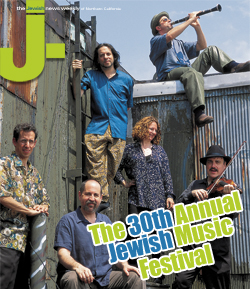After 30 years, the Bay Area’s Jewish Music Festival as we know it is going out with a bang, a trill and a heartfelt hallelujah.
Ellie Shapiro decided to step down as festival director and has declared 2015 the last year of the festival — at least in its present form. The reason: the Jewish Music Festival is financially unsustainable.
“We never had an endowment,” she told J. “Every year we would start from zero in terms of fundraising. Jewish music is expensive to do and Jewish culture is underfunded historically. It’s an ongoing challenge.”
The festival is a fiscally sponsored project of the Jewish Community Center of the East Bay. JCC executive director Amy Tobin acknowledges that the festival will have to go through structural, financial and leadership changes, but promises it will return in some form next year.
“I want the people who love [the festival] to know it’s not going away,” Tobin said. “It may be that the curatorial focus will be different, but they can count on the JCC to not drop it. There will be some programming next year. We haven’t designed it yet.”
Meanwhile, there will be plenty of music during the festival’s Feb. 26 to March 22 run at various East Bay venues.
The 2015 lineup includes some familiar names in Jewish music, including the venerable Klezmatics, Yair Dalal and Veretski Pass.
The festival kicks off Thursday, Feb. 26 with a musical appetizer, a reprise performance of last year’s “Di Megileh of Itzik Manger,” a fantastical Yiddish-flavored retelling of the Purimspiel, presented by the New Yiddish Theater at the JCC of the East Bay. Five performances through March 3 are scheduled.
Jewish Music Festival stalwarts the Klezmatics headline the official opening night concert March 5 at the New Parish in Oakland. Featuring trumpet player Frank London, the band has played the festival many times over the years.
Also on tap: a performance from the women’s chorale Kitka, this year celebrating International Women’s Day with a March 8 concert. The Oakland-based group will sing a mix of Eastern European songs as well as a new piece, “I Will Remember Everything,” based on the poetry of Russian Jewish lesbian writer Sophia Parnok.
As the show coincides with International Women’s Day, Kitka also will honor 88-year-old singer, liberal firebrand and former member of the Weavers, Ronnie Gilbert, with the Jewish Music Festival’s Shofar award.
Shapiro said Gilbert, who lives in Marin, represents “the values behind this festival. I share those values, mixing Jewish culture with progressive Judaism: the values of multiculturalism, pluralism, participation and empowerment. That’s what we try to do with this festival.”
Also set to perform: the rockin’ Sway Machinery sextet on March 10 and jazz bassoonist Paul Hanson on March 11 with a newly commissioned Jewish-themed piece. The multiethnic Israeli ensemble Diwan Saz will make its West Coast concert premiere March 14. Made up of Jewish, Muslim and Christian musicians, the band plays a wild mix of Arab, Turkish and Jewish tunes.
Footloose festivalgoers can get their high-step on at a string of dance workshops led by Yiddish dance specialist Steve Weintraub. He’ll lead a trio of sessions to teach Jewish dance moves, such as the sher, a kind of Yiddish square dance.
The Jewish Music Festival was a much smaller affair when it launched as the Berkeley Jewish Music Festival in 1985, but it was no less haimish and homey. The brainchild of the late German-born Ursula Sherman, who once served as a translator at the post-WWII Nuremberg Trials, the festival went on to become a staple of Bay Area Jewish cultural life.
In the early years, the festival paralleled the klezmer revival that swept North America and Europe. Klezmer dominated the festival’s musical lineup, but over time the aesthetic broadened to include music from Israel, Spain, North Africa and all other points Jewish.
The festival also benefited from major sponsorships. Support from such funders as the Koret Foundation, the Walter and Elise Haas Foundation, the Richard and Rhoda Goldman Fund, and the Jewish Federation of the East Bay allowed the festival to attract top artists and expand beyond Berkeley into San Francisco.
Leading Jewish music figures have performed at the festival over the years, among them Theodore Bikel, clarinetist Joel Rubin, klezmer artist Andy Statman and Cantor Benzion Miller.
Yiddish music specialist Gerry Tenny ran the festival for a few seasons. He was succeeded by producer Laura Sheppard (today the dramaturg of the Yiddish Theater Collective). Shapiro came on board in the late 1990s to co-chair with founder Sherman, and was named director in 2004.
Shapiro also started the festival’s tradition of commissioning new works, but of the many highlights of her tenure, she said the discovery of Arkady Gendler remains her proudest achievement.
An elderly Jewish singer from Ukraine, Gendler had performed at a St. Petersburg music camp Shapiro attended. She knew instantly he was a living treasure trove of unknown Yiddish folk music. She arranged to bring him to the festival in 2000 and also put him in the studio to record a CD, “My Hometown Soroke.”
Shapiro took a leave of absence after the 2012 festival to do field work on her doctoral dissertation on Jewish cultural initiatives in the towns and villages of Poland. Andy Muchin, now the Jewish Life coordinator for the JCC, filled in for her as director.
Coincidental with Shapiro’s hiatus, the Jewish cultural landscape in the Bay Area began to change. On the downside, local institutions such as the Jewish Theater and Israel in the Gardens folded. Elsewhere, KlezKamp, one of the oldest klezmer revival festivals in North America, held annually in upstate New York, wrapped its 30th and final installment last December.
On the plus side, Jewish music is on the ascent, according to those who toil in its vineyards.

